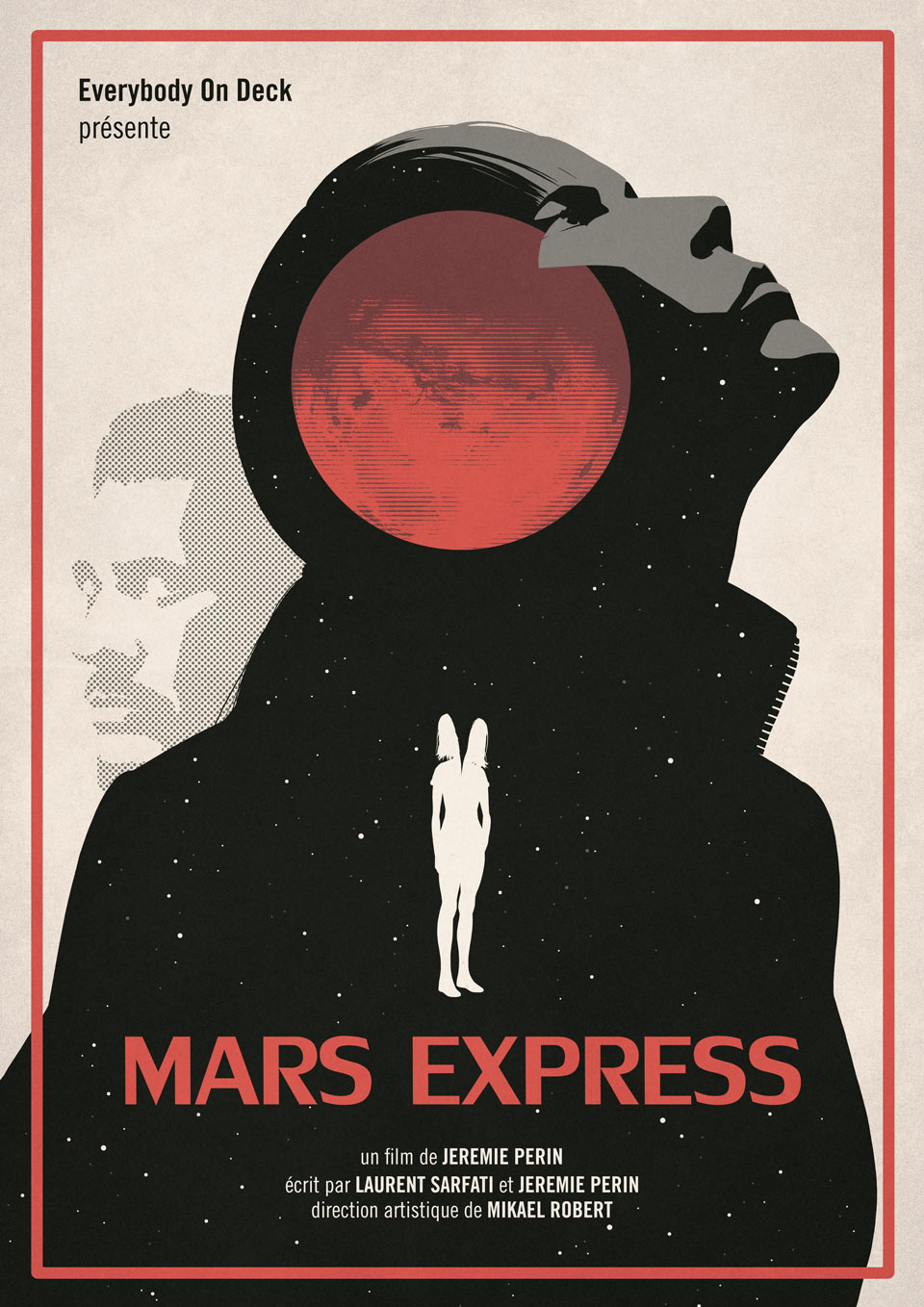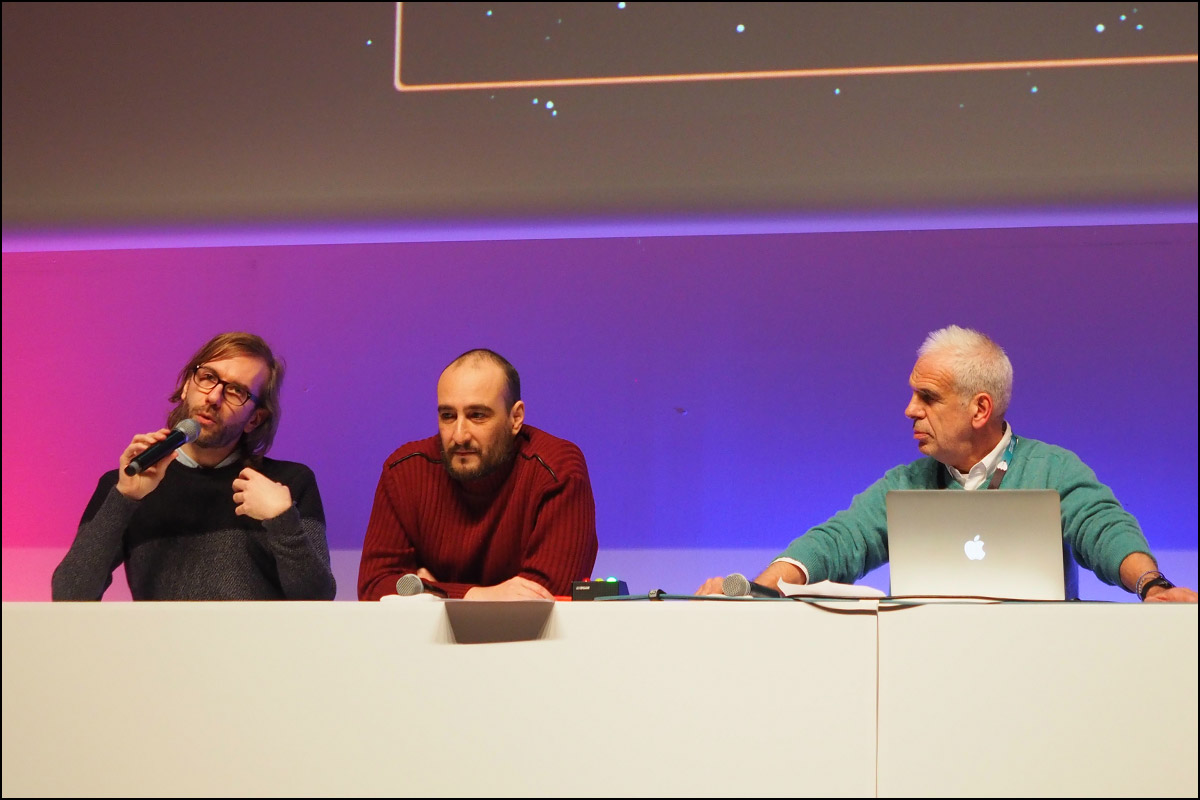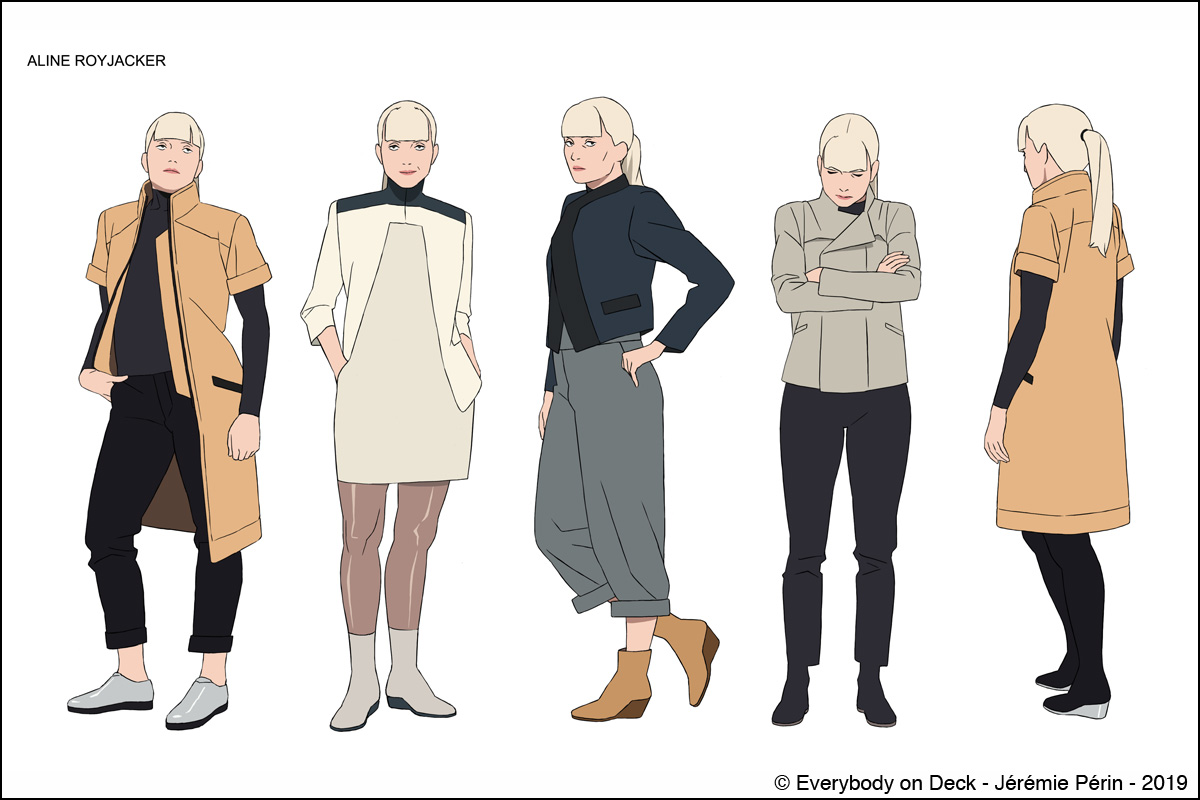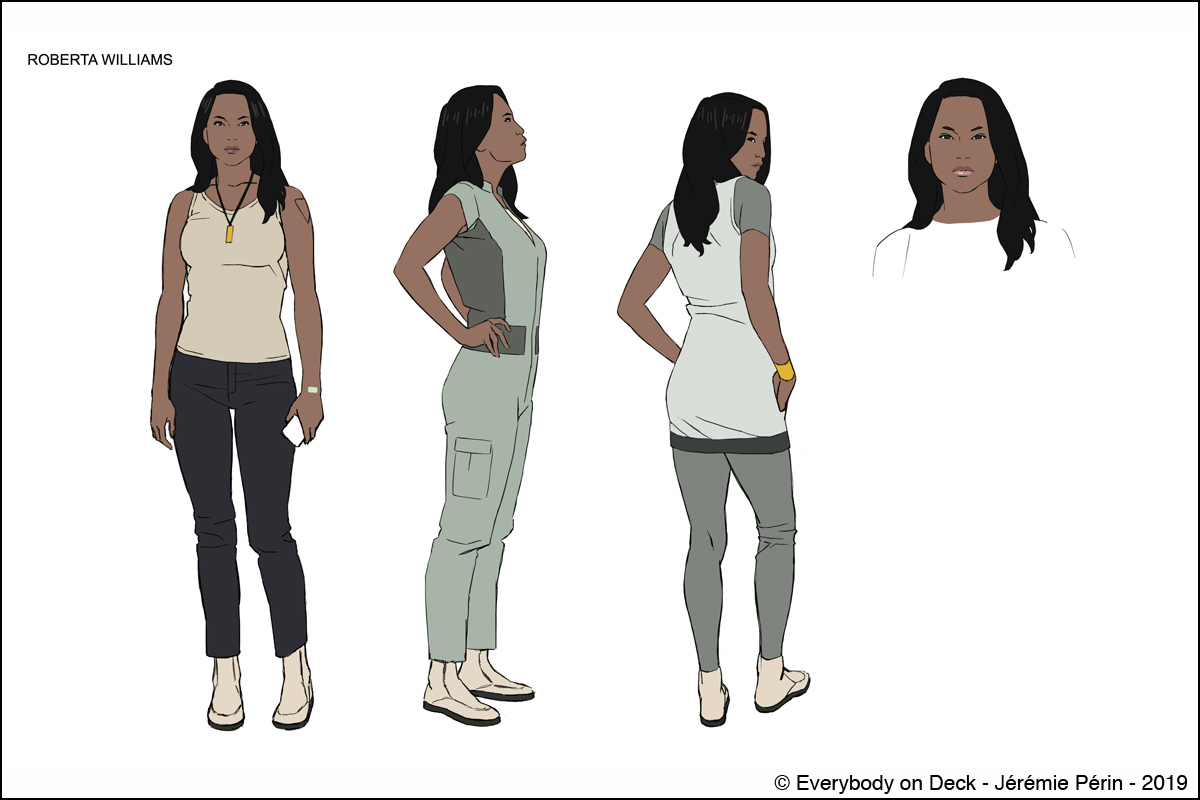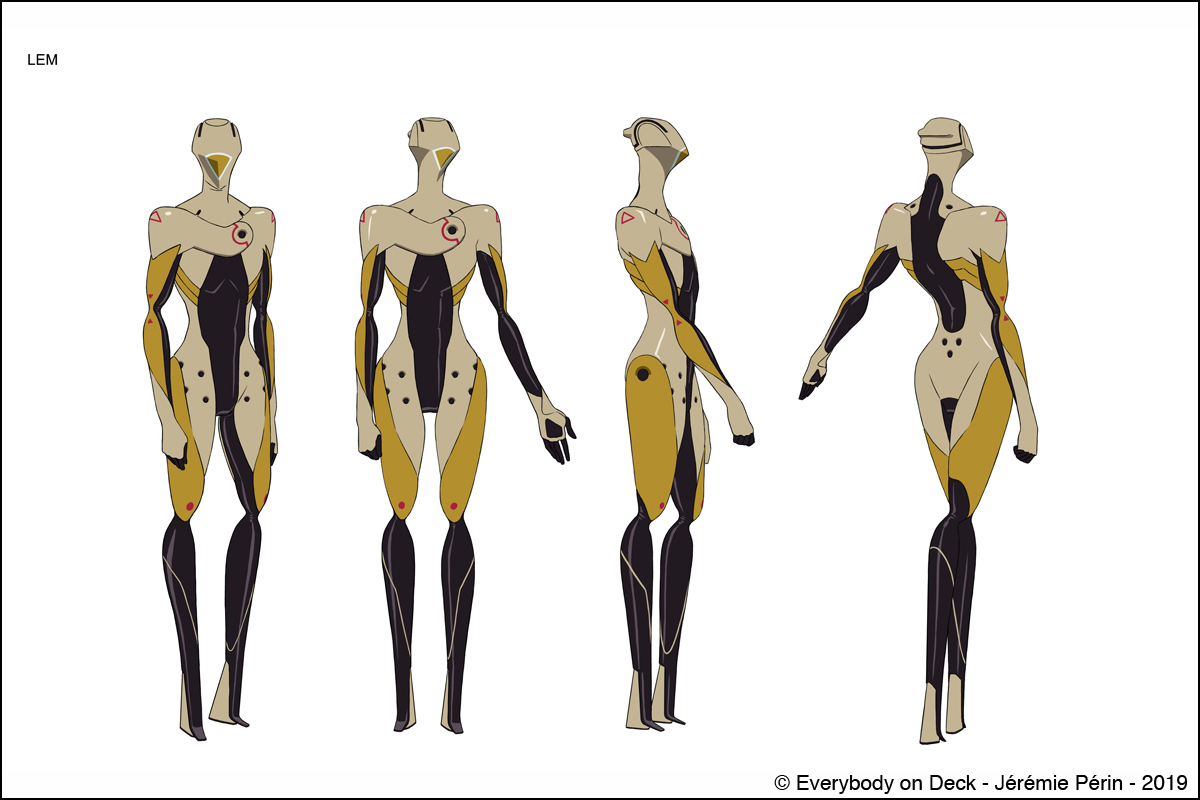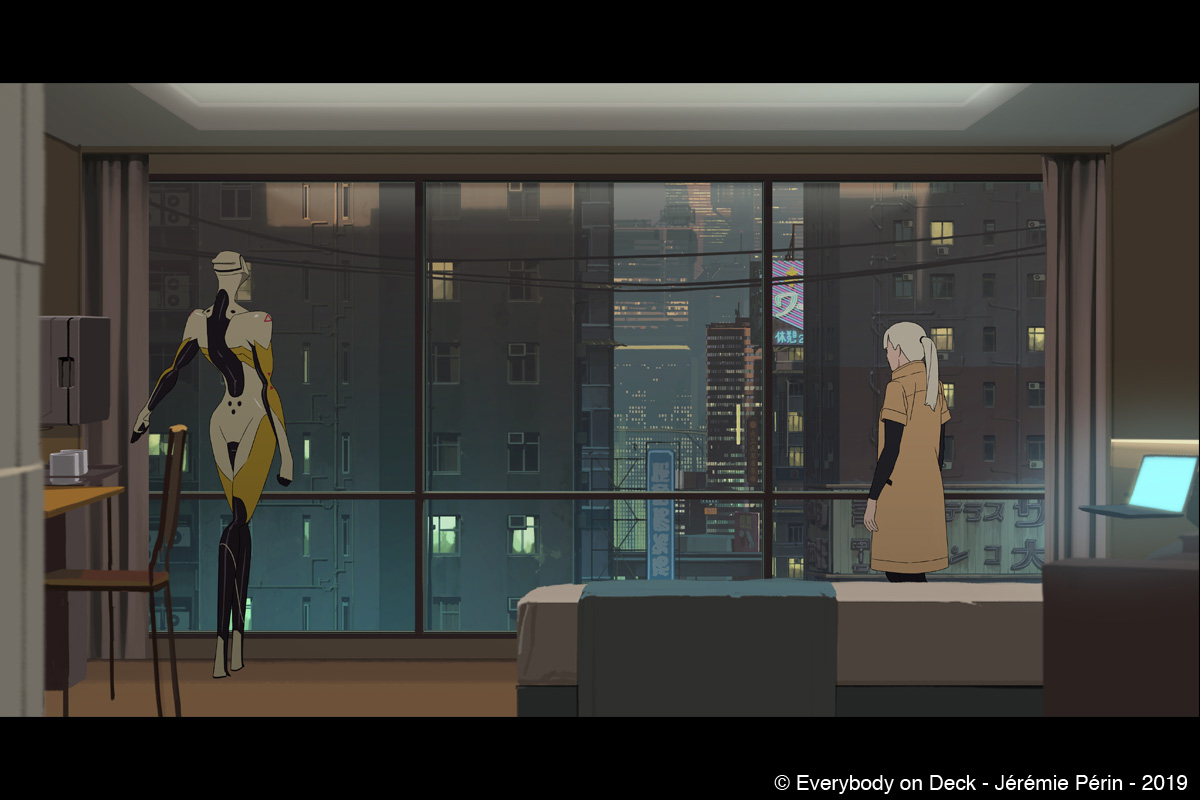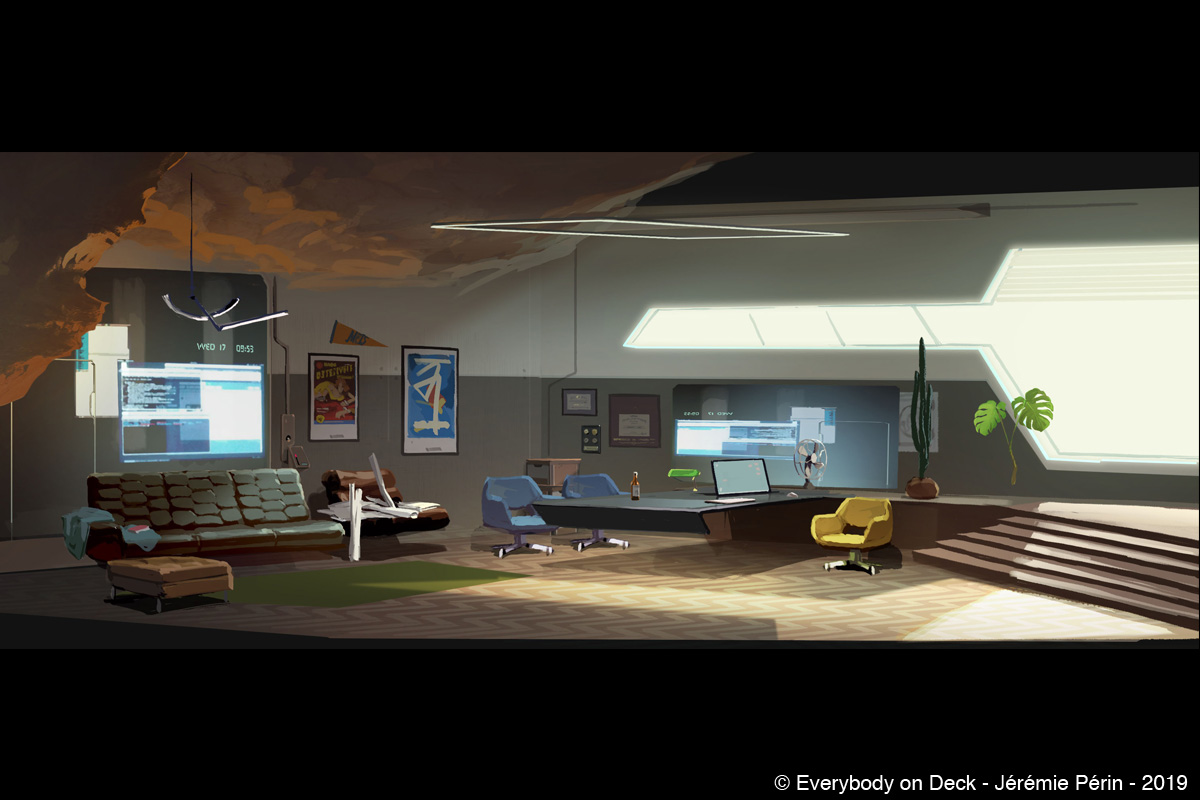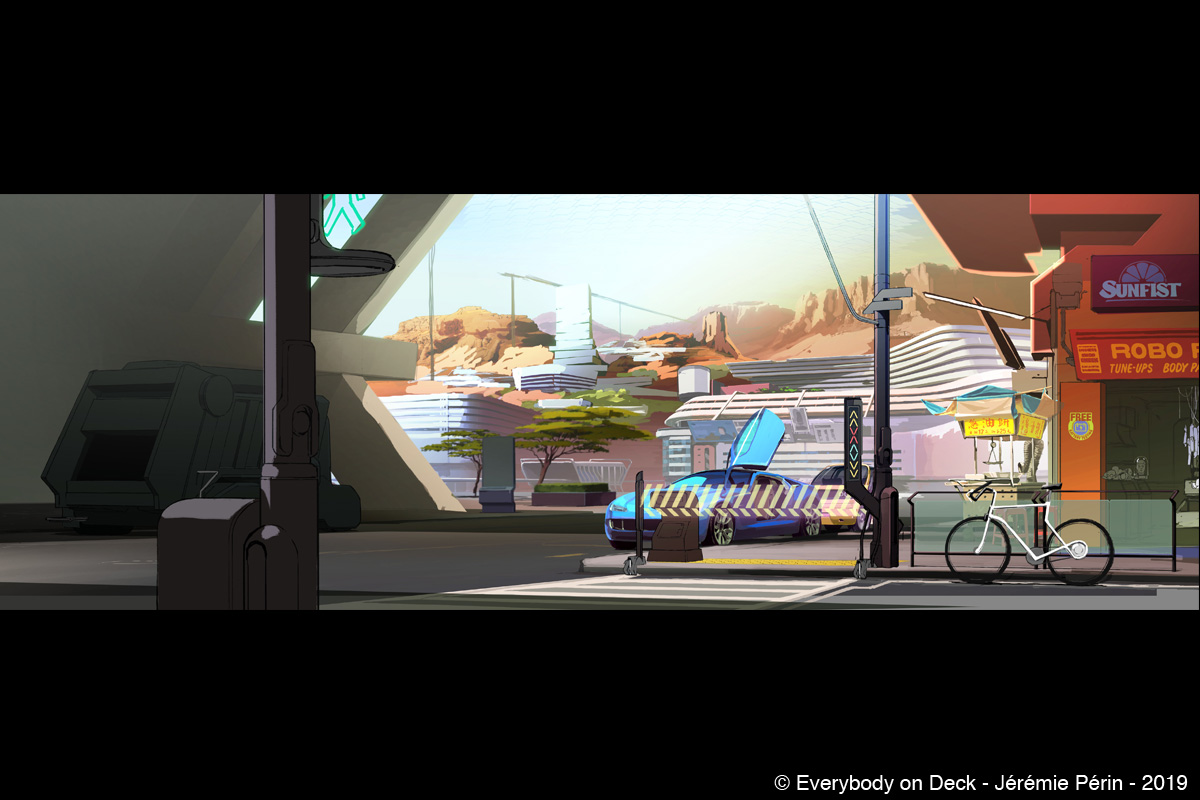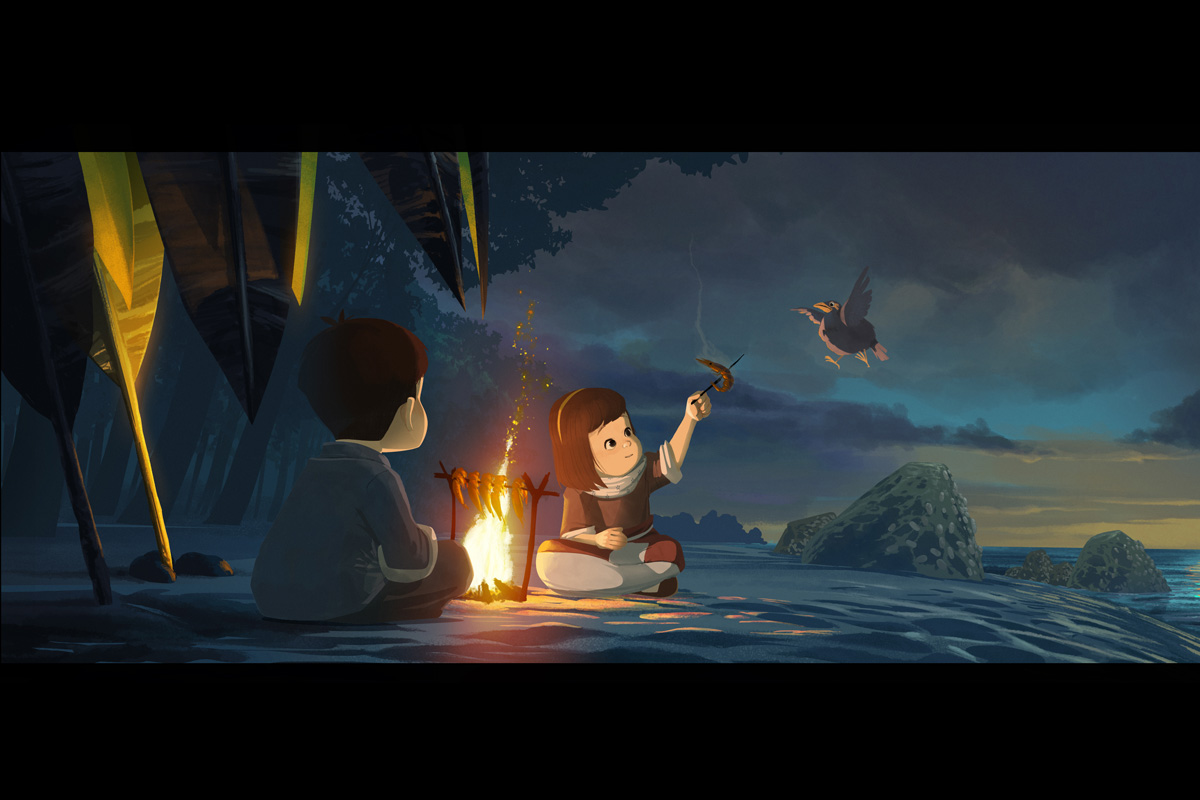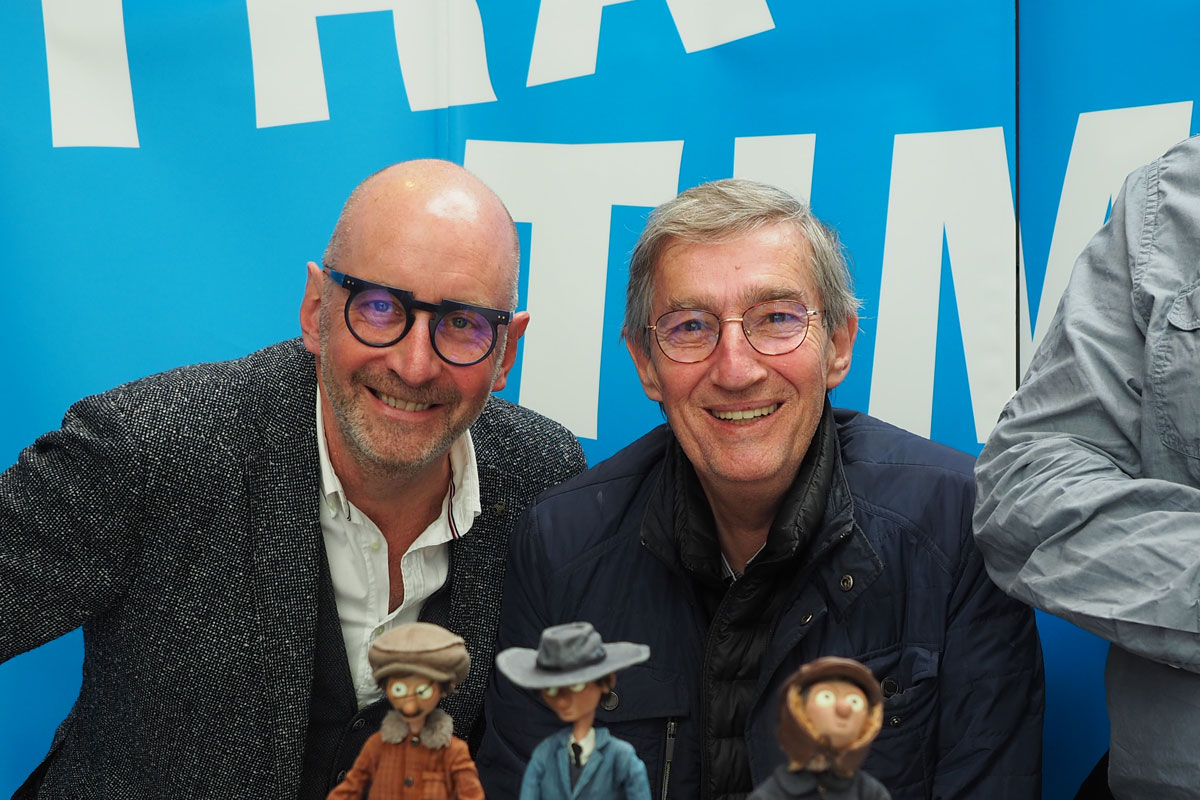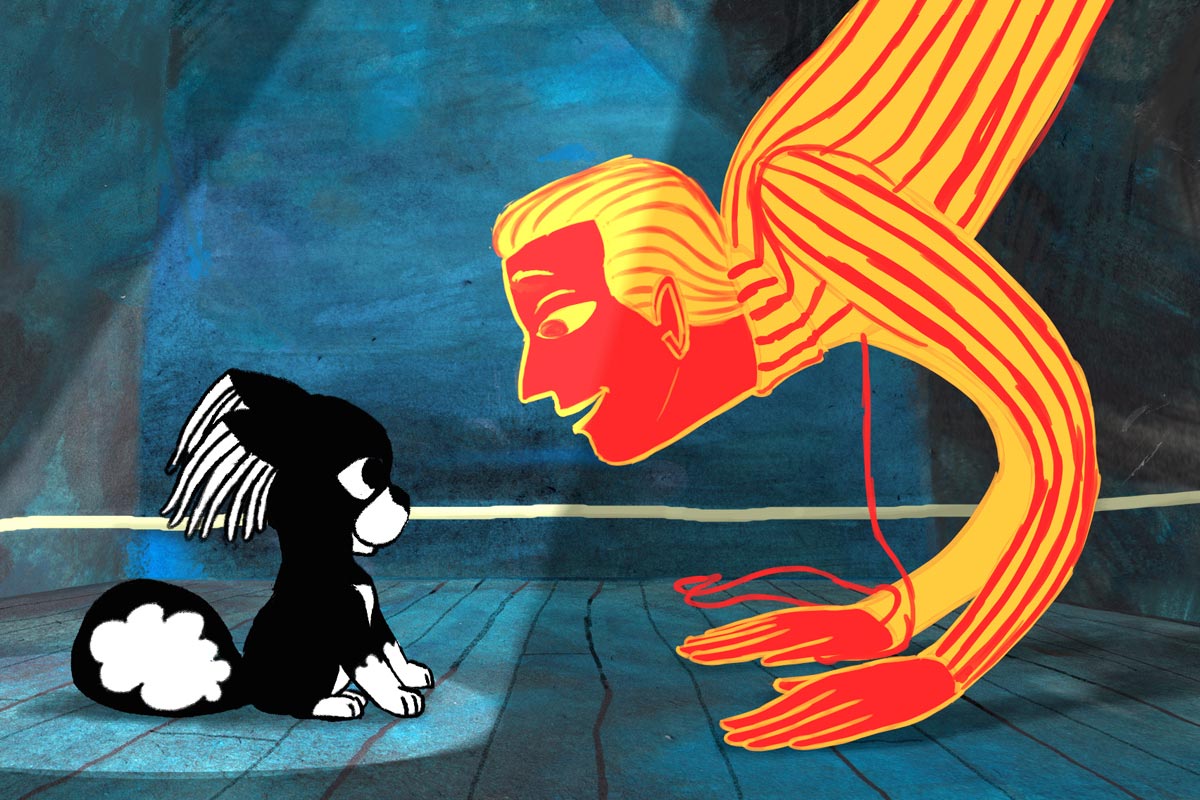Mars Express
(Status: in development)
Synopsis
Aline Ruby, a stubborn private detective, and her partner Carlos Rivera, who’s been dead for five years, set off on a race against time to Mars. Their mission is to find Jun Chow, a cybernetics student on the run, before the murderous assassins who are hot on her heels.
Mars Express
Director: Jérémie Périn
Author: Jérémie Périn
Producer: Didier Creste (Everybody on Deck, France)
Target audience: Young Adults / Adults
Technique: 2D digital
Mars Express is a 2D sci-fi/detective animation film project set in a Mars colony. Jérémie Périn and Laurent Sarfati, the core creators of Lastman (2016)* are reunited for this film project.
During Cartoon Movie 2019, we could have the opportunity to hear the story behind the exciting film project Mars Express from the director Jérémie Périn and the scriptwriter Laurent Sarfati.
*: Lastman (2016) is a French animated series for adults based on a popular comic series of the same name.
Interview with Jérémie Périn and Laurent Sarfati
Hideki Nagaishi (HN): Could you please let our audience know about the idea of the story, in brief?
Jérémie Périn: It’s a sci-fi movie, as well as a private-eye movie. We are following two characters, Aline Ruby and Carlos Rivera. Aline is a drunk who struggles with alcoholism.
Laurent Sarfati: At the beginning, she is a tough person and doesn’t smile. She is all about her job. But as soon as she drinks a drop, she becomes a sweet, nice, funny and tender person. As the story is getting more and more complex and the problems are piling up, her alcoholism problem will reappear. So, the drunk Aline is going to be an important character.
Jérémie Périn: Her associate is Carlos. He is a robot. In fact, he is a dead human who was subscribed to an insurance to be reborn as a robot. For him, he is a human because he kept his memories from the time when he was human. But for everybody else, he is a robot. So, he also struggles with the fact that no one recognizes him as human.
Laurent Sarfati: They are both detectives. The story is very classical: Aline and Carlos are hired by worried parents, because their teenage daughter disappeared and the police is after her, as she was suspected for piracy and hacking. It turns out that hitmen were also after her, so Aline and Carlos rush to find the girl before the police and the hitmen.
Jérémie Périn: In fact, they find her really soon in the movie, but she’s killed instantly. It’s at the beginning of the movie. So, both mission accomplished and mission failed. They are really disappointed and the movie could end there.
Laurent Sarfati: Then Aline started to drink again. She wakes up after a really huge party and she realizes that it is not the parents of the teenage girl who hired Aline and Carlos. It is, in fact, the killers, and they used them to find the target. They used some future technology to change their face, so they could look like the parents. When they go to the funeral of the girl, they see the real parents. They see that the faces are the same, but the bodies are totally different.
That makes them super angry and they do what detectives and private-eyes do when they are drunk and angry: They start to look where they shouldn’t look and ask the wrong questions to the wrong people. The real story unfolds.
Jérémie Périn: The real story is more about the robot and AI uprising. It is something that’s been inside the movie from the beginning, but it was almost muted. It’s really a background story that later in the movie becomes the main story.
Laurent Sarfati: What we hope is that the audience watching the movie will get very used to seeing these nice robotic slaves all the time: being very polite, holding a glass of water, doing everything. However, we want the audience, after that, to realize that it is a situation of apartheid. We wanted the audience thinks it’s completely normal, and after a while, they conclude: “But, they are sentient, yet treated like objects!”
Actually, what’s very important in the movie are the directives that are exactly like Isaac Asimov’s “Three Laws of Robotics”, meaning that all the AI have “locks” in their programming that forbid them to harm any human. But it is also like a prison of their mind. Their mind is in jail, they cannot think about some things, because they are forbidden to think about harming a human. That’s the background that becomes the main story at the end.
Jérémie Périn: Of course, the story of the disappearance of Jun, the daughter at the beginning, was linked to the main story. It was not like the movie changed the story, for whatever random reason. She has been killed because she knew too much.
HN: How did this film project start?
Jérémie Périn: It was because Laurent and I always wanted to make a Sci-Fi movie since long ago. We knew it would be a private-eye story on Mars that we wanted to write, but the story changed many times.
Meanwhile, we met Didier Creste, who is the producer of the movie, but at that time, he proposed me to direct an animated series which was an adaptation of a French comic Lastman. So, I decided to do it, and we worked together on it, with many other people of course.
After that, Didier wanted us to make a Lastman movie. I was really happy to make Lastman, but also a little bit bored of it, because I spent three years of my life on it, I wanted to do something else.
HN: What gives you creative inspiration for developing the story?
Jérémie Périn: When we work together, we never self-censor ourselves. We are using all the ideas, even the stupidest ones. And most of the time, it’s stupid, but it’s okay because you have to remove all inhibitions in the process.
Sometimes, we have some ideas that we see too much in movies, so we don’t use them. Sometimes, we’re okay with ideas that sounds not so new, because it’s good for the movie. In the end, what is the most efficient for the movie and its purpose is the right idea.
Laurent Sarfati: An effect that can happen is that we misunderstand each other, and from that misunderstanding, a new idea can emerge. That happens quite often.
Jérémie Périn: Of course, my inspiration for the movie I wanted to avoid is Blade Runner (1982), because it’s such a big reference for sci-fi movies. I wanted to quit that, and try to propose something else. That’s why, in the beginning, it could look like Blade Runner with those buildings, the dying Earth, and right after that, we are going to Mars, and Mars does not look at all like Blade Runner. It’s the opposite: It’s really horizontal, shiny and beautiful, but it’s totally artificial because when you’re out of the city, it’s just the Martian desert.
HN: I would like to hear about the visuals. How are you developing the visual design of the film’s universe?
Jérémie Périn: Ideally, I prefer not to think about the design during the writing process, because I know the script can change a lot at any moment. I prefer to preserve the virginity of my vision, and have all the ideas when I know the story is really completed and done.
After that, I think about the design in a pragmatic way. I’m like “Okay, what is the technology used for that robot. Is that robot old or new? How can I show the difference visually that this one is older than that one?”
We also look at science articles to prospect some ideas of new technologies in the future that we could expend and exaggerate for our movies, like how the transportation between Paris and Mars won’t be with rockets, as in other sci-fi movies; we found something else.
Laurent Sarfati: At the very beginning of the writing, we were constantly questioning ourselves about the scientific realism of our story. We ended up meeting with two Martian planetologists, and we asked: “What would the first Martian colony with two million people look like?” They were staring at each other. They studied Mars their whole lives, and they never thought about what a Martian colony would look like.
Jérémie Périn: We asked them where on the planet would be the best place to start a colony, so they had to think about that.
Laurent Sarfati: They opened a program, and they visited Mars on the program, and they say, “Oh yeah, I would put my colony here, there’s water and you can hide yourself in caves to be sheltered from the radiation.” It was fascinating for us and we did exactly that.
HN: What kind of experience or message do you want to deliver via this film to the audience?
Jérémie Périn: I don’t really enjoy movies with messages. I’m more into movies that asks questions to the audience to try to let them think about subjects that they may usually avoid. This movie asks some questions about free will. Do we really have free will? For some of our characters who are robots, they are programmed to think in one way and not another. They have this possibility at some point to crack that code that prohibits them from thinking about absolutely everything. We are questioning: do humans have something like that in their minds?
There are also many other questions asked by the movie, or a subject we are pointing to, like inequality through our society, and people who are used by powerful people.
Laurent Sarfati: There is a political aspect, but it’s really in the background. We don’t want to make a big thing about it. It’s just a background, but it’s important. The world where the story happens is like Elon Musk’s paradise. Mars is like a backup of Earth, which is completely polluted and dying. Now there is this beautiful place on Mars, where everyone is beautiful, rich and young. The truth is, that kind of system doesn’t work. They never work.
HN: So, you are showing one possibility of human society on Earth and Mars. There are of course some social issues the same as what we have now.
Jérémie Périn: We’re talking about our actual world, but exaggerate it and put it in the distant future, as a way of magnifying some aspects of it. Also, you would not be aggressing the audience or the people responsible for that situation by putting it in some virtual, imaginative world. It’s a way for people to step back and have a larger view of the topic. It’s really the subject of the movie, but it’s what we love in science fiction.
It is like with RoboCop. It is an action movie, but if you are scratching the surface, you’ll find some deep questions. Like what is alive, what is dead, what is the soul, who are we… But if you just want to watch an action movie, RoboCop can just be an action movie.
Laurent Sarfati: It’s really important, because even if you don’t pay any attention to its philosophical/political background, that’s what in fact supports all the action. Without that, everything becomes completely hollow.



